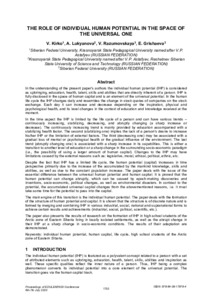Показать сокращенную информацию
THE ROLE OF INDIVIDUAL HUMAN POTENTIAL IN THE SPACE OF THE UNIVERSAL ONE
| Автор | Kirko, V. | |
| Автор | Lukyanova, A. | |
| Автор | Razumovskaya, V. | |
| Автор | Grishaeva, E. | |
| Дата внесения | 2021-08-13T09:33:13Z | |
| Дата, когда ресурс стал доступен | 2021-08-13T09:33:13Z | |
| Дата публикации | 2020 | |
| Библиографическое описание | Kirko, V. THE ROLE OF INDIVIDUAL HUMAN POTENTIAL IN THE SPACE OF THE UNIVERSAL ONE [Текст] / V. Kirko, A. Lukyanova, V. Razumovskaya, E. Grishaeva // Proceedings of EDULEARN20 Conference 6th-7th July 2020. — 2020. — С. 1755-1759 | |
| URI (для ссылок/цитирований) | https://iated.org/edulearn/ | |
| URI (для ссылок/цитирований) | https://elib.sfu-kras.ru/handle/2311/142854 | |
| Аннотация | In the understanding of the present paper’s authors the individual human potential (IHP) is considered as upbringing, education, health, talent, skills and abilities that are directly inherent of a person. IHP is fully disclosed in the space of human capital and is an element of the universal potential. In the human life cycle the IHP changes daily and resembles the change in stock quotes of companies on the stock exchange. Each day it can increase and decrease depending on the inspiration, physical and psychological health, and its level changes in the context of education and knowledge received at the moment. In the time aspect the IHP is limited by the life cycle of a person and can have various trends – continuously increasing, stabilizing, decreasing, and abruptly changing (a sharp increase or decrease). The continuously increasing trend is mainly provided by education accompanied with a stabilizing health factor. The second (stabilizing one) implies the lack of a person’s desire to increase his/her IHP or the limitation of external factors. The third (decreasing one) may be associated with a gradual loss of mental or psychological health or the gradual influence of the environment. The last trend (abruptly changing one) is associated with a sharp increase in its capabilities. This is either a transition to another level of education or a sharp change in the surrounding socio-economic paradigm (i.e., the possibility of using a larger amount of human capital). Changes to the IHP may have limitations caused by the external reasons such as: legislative, moral, ethical, political, ethnic, etc. Despite the fact that IHP has a limited life cycle, the human potential (capital) increases in time perspective primarily due to the increase of the accumulated by the mankind knowledge, skills and abilities, as well as due to the constant population increase. The paper deals with the issue of the essential difference between the universal human potential and human capital. It is proved that the human potential can change abruptly, which can be caused by epoch-making discoveries and inventions, socio-economic, political changes, as well as environmental disasters. In contrast to the potential, the accumulated universal capital changes from the abovementioned reasons, i.e. it must take some time for the potential to pass into the capital. The main engine of this transition is the individual human potential. The paper deals with the formation of the structure of human potential and capital. It is shown that the structure is of discrete nature and is formed by merging and combining IHP in various industrial, social, national and supranational forms to achieve certain results and achievements (industrial, social, political, scientific, etc.). The paper also presents the results of research on the formation of IHP in high school students of the Arctic zone of Eastern Siberia living in locally isolated settlements, as well as the abrupt change in their IHP at a sharp change in socio-economic conditions. The results of their adaptation are demonstrated. | |
| Тема | individual human potential | |
| Тема | human capital | |
| Тема | life cycle | |
| Тема | high school students of the Arctic zone of Eastern Siberia | |
| Название | THE ROLE OF INDIVIDUAL HUMAN POTENTIAL IN THE SPACE OF THE UNIVERSAL ONE | |
| Тип | Journal Article | |
| Тип | Journal Article Preprint | |
| Страницы | 1755-1759 | |
| Дата обновления | 2021-08-13T09:33:13Z | |
| Институт | Институт экономики, управления и природопользования | |
| Подразделение | Кафедра делового иностранного языка | |
| Журнал | Proceedings of EDULEARN20 Conference 6th-7th July 2020 | |
| Квартиль журнала в Web of Science | без квартиля |

